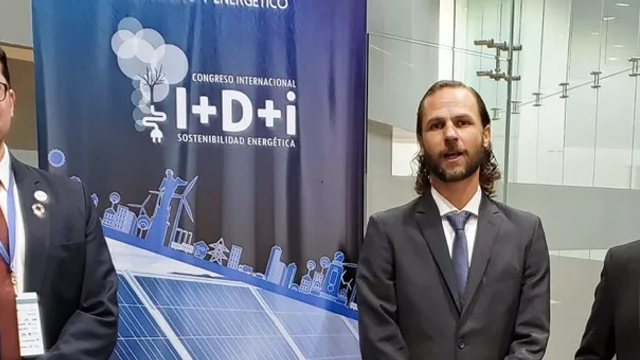SDSN Andes attends the 4th International Conference on Sustainable Energy and hosts the Water Research and Management of Ecosystem Services Seminar in Ecuador
On 18-20 November, 2019, SDSN Andes Secretariat staff attended the 4th International Conference on Sustainable Energy: Research + Development + Innovation, hosted by the Geological and Energy Research Institute at the Government Financial Management Platform headquarters in Quito, Ecuador. The Geological and Energy Research Institute is one of SDSN Andes’ member organizations in Ecuador.
The conference serves as a global forum for researchers and academics to present and discuss recent innovations in energy efficiency and renewable energies. It aims to promote and develop scientific research in these two sectors in the Latin American and Caribbean region, through the following objectives:
- Promote and demonstrate the advances in applied scientific research in sustainability energy.
- Promote interactions between national and international researchers.
- Involve high-level specialists and researchers with current national scientific work and facilitate access to scientific knowledge.
- Motivate the participation and contribution of women in the field of science.
- Highlight sustainable energy initiatives of companies and institutions, which contribute to the fulfillment of the objectives of Agenda actions and the SDGs.
A high-level event, plenaries included presentations by the Minister of Energy and Non-Renewable Natural Resources, Mr. Carlos Pérez as well as by two of SDSN Andes’ members, Grupo Faro and Fundación Futuro Latinoamericano, focused on data promotion to monitor and implement SDG 11 and clean energy in Ecuadorean cities, respectively.
Some of the topics addressed include: smart cities, electric mobility, technology and innovation to remove plastics from rivers and oceans, geothermal potential, green buildings, and deep decarbonization.
Later in the week, on 21-22 November, 2019, as part of the Mira and Mataje Rivers Binational Basin Biodiversity Conservation Project, SDSN Andes hosted the Seminar on Water Research and Management of Ecosystem Services in the Mira River Basin (Ecuador) hosted at the Universidad Técnica del Norte (UTN) in the city of Ibarra.
The two-day seminar brought together researchers, graduate students, representatives from local irrigation boards, and local officials. Opening remarks were given by Dr. Marcelo Ceballos, the Dean of UTN and Dr. Jorge Gómez Paredes, Manager of SDSN Andes.
The seminar’s agenda included 19 presentations, 5 plenary sessions, and an award ceremony for scientific papers. Some of the topics addressed include: flora and fauna, strategic conservation efforts, biodiversity, irrigation systems, governance, ecological integrity monitoring, water quality and contamination, and mining.
The purpose of the project is to improve conditions that are conducive to the conservation in the Mira-Mataje Rivers Binational Basins through a combination of scientific knowledge and territorial governance.
The objectives of this three-year project are:
- To support decision-making processes in the binational basins by providing high quality, timely and easily accessible information
- To promote the maintenance of the ecological integrity of the binational basins, through an improvement in the resilience of their ecosystems and a better understanding and protection of their ecosystem services
- To improve the governance conditions in the binational basins, generating and / or supporting coordination and collaboration between actors, seeking participatory planning and implementation of management strategies, and promoting a holistic vision of the basin
The institutions that comprise the Mira Mataje Binational Basin Consortium include: Corporación Grupo Randi Randi, Fundación Ecológica Los Colibríes de Altaquer, Universidad de Nariño, Instituto Nacional de Biodiversidad, Universidad Regional Amazónica, Instituto de Investigaciones Ambientales del Pacifico, and SDSN Andes. The overall project aligns with Target 6.5 – water resources management: By 2030, implement integrated water resources management at all levels, including through transboundary cooperation as appropriate.
